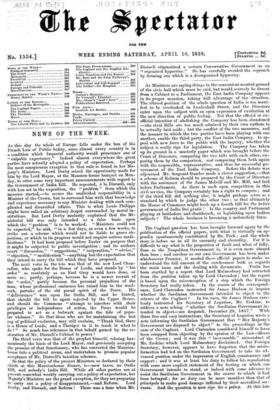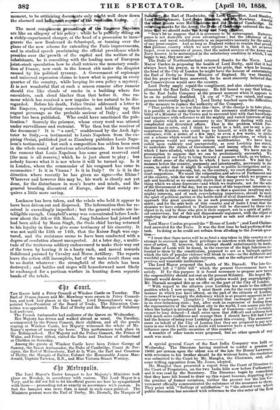NEWS OF THE WEEK.
AT this day the whole of Europe falls under the ban of the French Law of Public Safety, since almost every country is in
a condition which Imperial authority would pronounce one of "culpable expectancy." Indeed almost everywhere the great parties have actually adopted a policy of expectation. Perhaps the most conspicuous exception to that rule is found in her Ma-
jesty's Ministers. Lord Derby seized the opportunity made for him by the Lord Mayor, at the Mansion-house banquet on Mon-
day, to utter some very important announcements with regard to
the Government of India Bill. He repeated, a. la Disraeli, only with less art in the exposition' the " problem " from which the
measure started,—to secure the undivided responsibility in a Minister of the Crown, but to surround him with that knowledge and experience necessary to any Minister dealing with such com- plicated and diversified affairs. This is what Louis Philippe might have called an arbitrary despot surrounded by moral in- stitutions. But Lord Derby modestly explained that the Mi- nisterial bill was only intended as a false basis upon which the " problem " is to be worked. "Ministers could not be expected," he said, "in a few days, or even a few weeks, to strike out a scheme which would not be liable to grave ob- jections, or which in its progress would not require serious modi- fications." It had been proposed before Easter on purpose that it might be subjected to public investigation ; and its authors court "discussion," "suggestions," "cooperation," "advice," "objection," "modification "—anything but the expectation that they intend to carry the bill which they have proposed.
The next voice in the trio was that of the new Lord Chan- cellor, who spoke for the House of Lords, and stands by "his order" as resolutely as an Earl Grey would have done, or more so ; partly, perhaps, because he is a newer recruit of the "order," partly because the personal prejudices of the man, whose professional eminence has raised him to the wool- sack, partake of the old proud spirit of the Peers. His " deliverance " was upon the Oaths Bill, and he hinted, that should the bill be again rejected by the Upper House, and should the Commons "attempt to interfere with . their privileges or independence of action, the Peers would be prepared to act as a bulwark against the tide of popu- lar violence." So that those who are for maintaining the last rag of political exclusion, may still exclaim, "Thank God, there is a Rouse ofLords, and a Thesiger in it to teach it what to do ! '3' So much has tolerance in that behalf gained by the re- storation of Mr. Disraeli's Cabinet to power !
The third voice was that of the prophet himself, echoing har- moniously the hints of the Lord Mayor, and graciously accepting the promise of that functionary, who has converted the Mansion- house into a political arena, and undertaken to promise popular acceptance of Mr. Disraeli's taxation schemes.
So that the policy of the present Ministers as declared by their chiefs at this Mansionhouse dinner, is—new taxes, no Oaths Bill, and nobody's India Bill. While all other parties are at present somewhat weakly carrying out a policy of expectation, her Majesty's Ministers are the grand exception, for they are preparing to carry out a policy of disappointment,—and Reform. Lord Derby, and Disraeli, and Reform ! There was a time when Mr. Disraeli stigmatized a certain Conservative Government as an "organized hypocrisy." He has carefully avoided the reproach by forming one which is a disorganized hypocrisy.
As Ministers are saying things in the convenient neutral ground of the civic hall which must be said, but would scarcely be decent from a Cabinet to a Parliament, the East India Company appears in its proper mansion, taking full advantage of the situation. The altered position of the whole question of India is too mani- fest to be overlooked in Leadenhall Street, and the Directors enter upon the subject with an open expression of exultation at the new direction of public feeling. Not that the official or ex- official intention of abolishing the Company has been abandoned —the rival Bills are too much admired by their own authors to be actually laid aside ; but the conflict of the two measures, and the manner in which the two parties have been playing with one another, enable the third party, the East India Company, to ap- peal with new force to the public with the inquiry, whether the subject is really ripe for legislation. The Company has taken up its ground in a masterly paper which was brought before the Court of Directors, comparing the two bills with each other, ex- posing them by the comparison, and comparing them both again with the responsible, representative, and thus far successful go- vernment of the East India Company. Before the debate was adjourned Mr. Sergeant Gaselee made a clever suggestion,—that a scheme of Reform should be prepared by the Court of Directors with the assistance of Sir James Melvin and Mr. Mill, and laid before Parliament. As there is such open competition in this civil service, the Company certainly has a right to compete ; and if the third bill did nothing else, it might perhaps serve as a standard by which to judge the other two ; so that ultimately the House of Commons might hash up a fourth bill for the better government of India Dei grata ! Is the country and Parliament playing at battledore and shuttlecock, or legislating upon Indian subjects ? The whole business is becoming a melancholy farce.
The Cagliari question has been brought forward again by the publication of the official papers, with what is virtually an ap- pendix spontaneously contributed by Mr. Park ; and the whole story is before us in all its enormity and absurdity. For it is difficult to say what is the proportion of fault and what of folly. Base as the Neapolitan Government is, it is even more absurd than base ; and careless as our own Government has been under whichsoever Premier, it needed these official papers to make us understand the full amount of the carelessness both as regards the main issue and the dealing with documents. Turin has been startled by a report that Lord Malmesbury had retracted from the position taken up by Lord Clarendon ; but the report is based upon the misconception of a step which the Foreign Secretary had really taken. In the course of the correspond- ence, Lord Clarendon instructed Sir James Hudson to inquire whether the Sardinian Government intended to object to the aeizure of the Cagliari ? In his turn Sir James Hudson care- lessly instructed his Secretary of Legation, Mr. Erskine, to address a note asking "whether the Sardinian Government in- tended to object—see despatch, December 29, 1857." With these free and easy instructions the Secretary of Legation wrote a note informing the Sardinian Government that "Her Majesty's Government are disposed to object" to the proceedings n the case of the Cagliari. Lord Clarendon considered himself to have been estopped from objecting by the opinion of the Law-officers of the Crown ; and it was this " inexcusable" misconduct of Mr. Erskine which' Lord Malmesbury disclaimed. Our Foreign Secretary, however, appears to have forgotten that the misin- formation had led on the Sardinian Government to take its ad- vanced position under the impression of English countenance and support ; and it was at least his duty to follow his repudiation with some more explicit statement of the footing on which our Government intends to stand, or indeed with some advance to assist the Sardinian Government in the course to which it had been betrayed ; for no duty can be more manifest than that of principals to make good damage inflicted by their accredited ser- vants. And the question is now ripe for a policy. At this late
moment, to be criticizing.docunepts only might well draw down the alarmed and indignant' reptile of the Sardinian Envoy.
The most eonspienoss prooçedin dr tita Emperor Napoleon
are like an allegory' of hie" policy : 6 heis putlicIy ling on a richly-e.aparisoned charger' at the head of a procession to inau- gurate the new Boulevard de Sebastopol, or turning over the plans of the new scheme for extending the Paris improvements, and in studied speech proclaiming the official providence which presides over the growth of the capital and the welfare of its inhabitants, he is consulting with the leading men of European joint-stock speculation how he shall retrieve the monetary condi- tion of France, now sunk to the lowest ebb under the disquiet caused by his political tyranny. A Government of espionage and universal repression claims to know what is passing in every quarter of the country, while keeping its own policy a mystery. It is not wonderful that at such a season rumour after rumour should rise like clouds of smoke in a building where fire smoulders, each cloud blacker than that before it. One ru- mour which has received a new impulse is too natural to be dis- regarded. Before his death, Felice Orsini addressed a letter to the Emperor, repudiating asssissination, and holding up that august personage as the probable saviour of Italy ; and this letter has been published. Who could have sanctioned the pub- lication? Scarcely the prisoner, whose every word was uttered under surveillance and restraint. Who then but the receiver of the document ? It is "a card," readdressed by the Arch Agi- tator to Italy,—a testimonial to Louis Napoleon from the ex- piring Orsini, published just as Eisenberg publishes Louis Napo- leon's testimonial ; but such a composition has seldom been seen in the whole round of notorious advertisements. It has revived the rumour that Louis Napoleon has some great reserved card (the man is all reserve,) which he is just about to play ; but nobody knows what it is nor where it will be turned up. Is it in London, where the commander of his vanguard has come to reconnoitre ? Is it in Vienna? Is it in Italy ? Or is it in the direction where recently he has given no signs—the Rhine ? Wherever and however this may be, his work is dearly not yet done for the disturbance i men's hearts and minds, and the general brooding discontent of Europe, show that society re- quires a little more saving.
Lucknow has been taken, and the rebels who held it appear to have been driven out and dispersed. The information thus far re- ceived is exceedingly imperfect; but the general results are in- telligible enough. Campbell's army was concentrated before Luck- now about the 5th or 6th March. Jung Bahadoor had joined and had been aided by Mann Singh, the Oade chief having returned to his loyalty in time to give some testimony of his sincerity. It was not until the 13th or 14th, that the Kaiser Bagh was cap- tured, and the resistance seems to have been conducted with a degree of resolution almost unexpected. At a later day, a multi- tude of the traitorous soldiery endeavoured to make their way out of the town by leaving it in a hasty rush, and moved towards Rohilcund pursued by Cavalry and Horse Artillery. The reports leave the action still incomplete, but of the main result there can be no doubt whatever : the stronghold of the rebels has been destroyed ; and battles and sieges will henceforward most likely be exchanged for a partisan warfare in hunting down separate bands of the rebels.



























